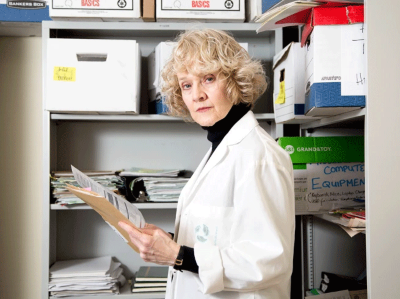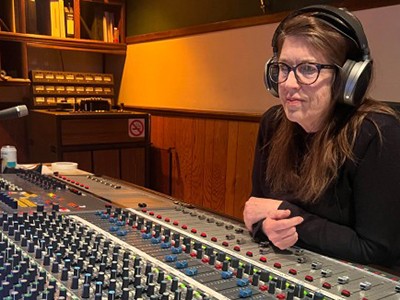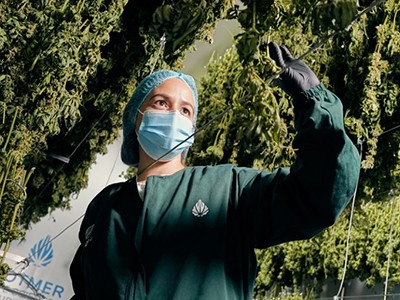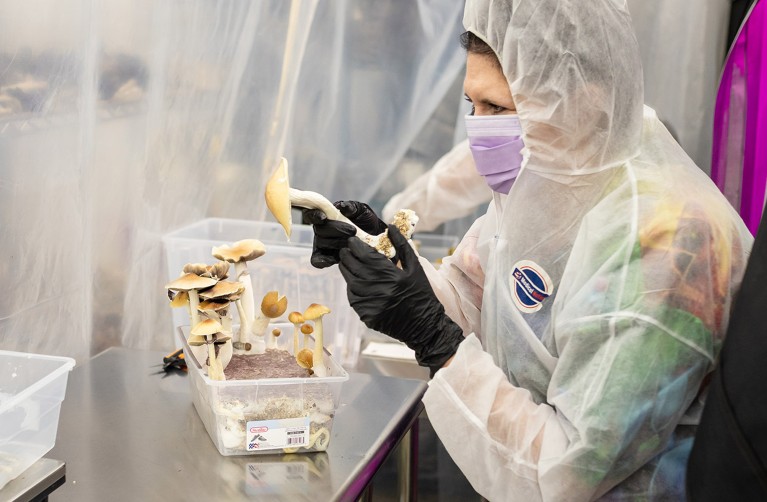
Sue Sisley’s group has grown entire psilocybin-producing mushrooms for medical trials.Credit score: Andrew Neugebauer/STOKE Artistic
From the earliest days of her profession, doctor Sue Sisley has been enthusiastic about caring for US army veterans. Again then, lots of the individuals she handled have been self-medicating with black-market hashish as a result of, in contrast to prescribed drugs, marijuana allayed nightmares and different signs of post-traumatic stress dysfunction (PTSD). Just a few puffs helped them to go to sleep.
“Initially, I discouraged them and rolled my eyes eager about it,” says Sisley, whose coaching taught her to view solely accredited medicine as medicines. “I lacked sympathy for his or her claims and thought they have been drug seekers.”
Whistleblowing in science: this doctor confronted ostracization after standing as much as pharma
However over time, Sisley noticed how the ineffectiveness of mental-health remedies might gas hopelessness. Presently, 17 US veterans die by suicide each day, on common. The hashish customers amongst Sisley’s sufferers have been usually those who maintained a will to stay.
“It made me understand that I used to be very misled, by the federal government and our coaching programmes, to imagine that hashish was harmful,” she says. “I didn’t find out about any medical advantages.”
The early classes from her sufferers influenced Sisley. Over the subsequent twenty years, she challenged US federal businesses, navigated a authorized and regulatory maze and creatively secured funding to research and develop remedies, based mostly on hashish and psychedelics, that the US authorities had blocked for many years.
A physician-researcher is born
After the US Congress handed the Managed Substances Act of 1970, hashish was made unlawful and categorised as a Schedule I drug, outlined as having no accepted medical use. That put marijuana in the identical class as heroin and most psychedelic medicine: possession or use of the drug, and rising hashish with no Schedule I analysis licence, might land somebody in jail.
Within the mid-Nineties, a number of US states started defying federal regulation, permitting adults to buy hashish for medicinal functions. In 2008, when medical marijuana was nonetheless off limits in Arizona, Sisley was one of many few physicians who spoke publicly about legalizing it. Her advocacy caught the eye of Rick Doblin, who sought to get sure psychedelic medicine and hashish taken off Schedule I in order that they may very well be studied and any medical advantages reaped.
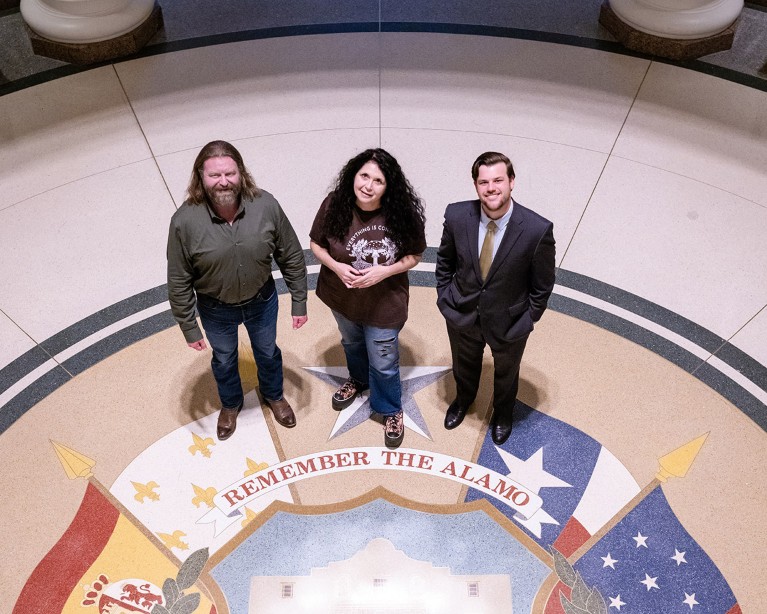
Sisley (centre) visits the Texas state capitol to advocate for analysis on psychedelics.Credit score: Andrew Neugebauer/STOKE Artistic
Doblin based a US non-profit physique, the Multidisciplinary Affiliation for Psychedelic Research (MAPS), to lift cash from non-public donors for medical trials. He approached Sisley to steer a hashish research.
Though she lacked a background in analysis, Sisley was an affiliate professor of psychiatry and assistant director of telemedicine on the College of Arizona School of Medication in Phoenix, and Doblin noticed her potential. “What actually appealed to me is that Sue appears to the place science is being blocked by politics, and he or she’s prepared to face up for what she thinks is correct,” he says.
In 2014, Sisley and MAPS acquired almost US$2.2 million from the state of Colorado. With approval from the US Meals and Drug Administration (FDA), they have been poised to steer the world’s first randomized managed trial of smoked hashish as a remedy for PTSD in veterans.
However then the College of Arizona declined to resume Sisley’s contract. Though Sisley says that the college merely acknowledged that her providers have been now not wanted, she thinks there have been political pressures concerned.
Working Scientist profession profiles
“Regardless that it was respectable analysis” and Arizona voters had accredited the medical use of marijuana in 2010, Sisley says, “I imagine some legislators didn’t need something associated to hashish to have a spot on the college.”
In the long run, nonetheless, the termination of her contract “turned out to be an enormous reward”, she says. She learnt that she didn’t want a college or hospital to steer the analysis. In actual fact, she now thinks the forms might need slowed her down. Within the following two years, Sisley co-founded the Scottsdale Analysis Institute, bought a constructing for it in Phoenix, Arizona, and constructed a laboratory to start her research.
In 2016, as she ready to enrol members, the hashish for the research arrived. On the time, the College of Mississippi in Oxford was the only US government-approved supplier of hashish to be used in human analysis. However when Sisley opened the field, she was horrified. The hashish was mouldy, pulverized into powder and suffering from twigs. It was nothing just like the buds offered at dispensaries, and a few members had problem in inhaling it as a result of it irritated their throats.
Sisley’s group discovered that members who smoked hashish confirmed enchancment over the placebo group, however not sufficient to show statistical significance (M. O. Bonn-Miller et al. PLoS ONE 16, e0246990; 2021). Sisley thought that if members had entry to the hashish accessible in dispensaries, they may have tolerated it higher and skilled extra advantages.
To boost consciousness about boundaries to hashish analysis, Sisley went on a talking tour (along with Dodger, her information canine). In 2019, on the South by Southwest convention on music, movie, tradition and expertise in Austin, Texas, she described what was, by then, a ten-year battle to finish her medical trial, and a transfer by the US Drug Enforcement Administration (DEA) which may assist. In 2016, the company had introduced a coverage that aimed to broaden the federal government’s hashish provide, so Sisley utilized for a Schedule I licence to develop hashish for a section IIb trial. However, after two-and-a-half years, the DEA nonetheless had not processed her software.
Suing the federal government for science
Matthew Zorn, an lawyer based mostly in Houston, Texas, attended Sisley’s discuss. He had change into thinking about marijuana as a ache remedy whereas caring for his companion, who later died of bone most cancers, and was angered by the purple tape surrounding the drug provide for trials. “All Sue was attempting to do was advance analysis. She did every little thing by the e-book,” says Zorn. If the hashish utilized in a trial “is rubbish, in fact you possibly can’t show one thing is protected and efficacious, after which it’s not going to be accessible for sufferers”.
Zorn recruited his colleague Shane Pennington, then additionally based mostly in Houston, who had expertise of bringing circumstances in opposition to federal businesses. Collectively, representing Sisley professional bono, they helped her to sue the DEA in 2019.
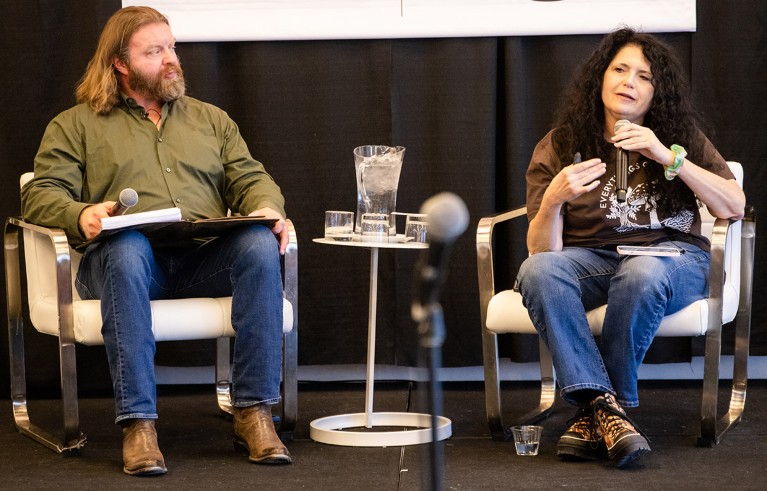
Sue Sisley speaks on the 2025 South by Southwest pageant in Austin, Texas.Credit score: Andrew Neugebauer/STOKE Artistic
The lawsuit prompted the US Workplace of Authorized Counsel to launch a memo that exposed why the DEA had been sitting on Sisley’s hashish software. The US authorities had handed over management of the hashish provide for medical trials to the College of Mississippi when, below the phrases of a world treaty, it was supposed to make sure that a single authorities company possessed and distributed the provision.
With the memo’s launch, “they realized they needed to do one thing”, says Anthony Coulson, former assistant particular agent accountable for the DEA’s district workplace in Tucson, Arizona. “Sisley’s lawsuit compelled the DEA to the desk.”
Two months after the lawsuit was filed, the DEA started processing Sisley’s software and dozens from different US scientists, permitting them to develop medical-grade hashish for analysis research. This was essential, as a result of hashish utilized in section III trials should match what’s available on the market for sufferers, whereas the federal government’s provide of hashish didn’t.
“Due to Sue’s years of sacrifice, she constructed a basis for each single hashish researcher,” says Coulson.
Sisley’s case was settled in 2020, and he or she feels the wrestle was price it (see ‘Fast-fire Q&A’). “There are such a lot of individuals struggling who would possibly get their lives again and profit from this analysis.”
Round this time, Sisley heard from individuals who have been self-administering the drug psilocybin, present in sure mushrooms, to deal with situations resembling cluster complications and suicidality. She started studying up on psilocybin remedy and learnt that only a few periods might suppress PTSD signs for months or years, though members needed to meet with therapists to arrange for and study from their psychedelic experiences. Against this, individuals usually smoke hashish each day to keep up its results.
After Sisley acquired her hashish Schedule I licence, she rapidly filed an software to farm psilocybin-producing mushrooms. The DEA accredited it instantly and “appeared to be cheering for us”, says Sisley.
Coulson has a concept about why the company — which not solely enforces drug legal guidelines but additionally has a core worth of enhancing public well being — would possibly now be on Sisley’s aspect. “They need her to succeed as a result of she is pushed to maneuver the science ahead by a better altruistic motive of serving to sufferers,” he says. “When you get to know her, you understand there’s no outdoors agenda. That’s the magic with Sue.” Since he retired from the DEA in 2010, he has acted as a guide for Sisley whereas she constructed the infrastructure for her research.
A quest to review pure medicines
In present psilocybin medical trials, members obtain an artificial model of the drug that provides exact dosing, which appeals each to the FDA and to pharmaceutical firms.
However Sisley is keen to vary that. She needs to review entire mushrooms to research whether or not the varied chemical compounds in them present well being advantages. She additionally sees potential to develop more-affordable remedies, as a result of mushrooms will be grown inexpensively.
Now, Sisley is striving to steer the world’s first FDA-approved research of entire mushrooms containing psilocybin. However as soon as once more, she has needed to overcome a number of obstacles.
Decriminalization of marijuana opens doorways for some scientists
First, she needed to work out learn how to ship mushrooms to satisfy the FDA’s dosing requirements. However there was no printed protocol for this.
Nicole Nichols, govt director of the Scottsdale Analysis Institute, grows edible mushrooms and volunteered to develop such a protocol. Initially, she and Sisley tried delivering mushrooms in a heat tea, however the outcomes have been erratic. Then they tried utilizing capsules, however realized that it will take 18 capsules to ship the required dose.
Finally, they experimented with chocolate, which masked the mushrooms’ unpalatable flavour and served as a protecting wrap that stabilized psilocybin. After persistently hitting the FDA’s dosing necessities, they printed their protocol (R. Goff et al. Anal. Chim. Acta 1288, 342161; 2024).
“We’re getting inquiries from investigators everywhere in the world who need entry to federally authorized mushrooms which are standardized,” says Sisley.
